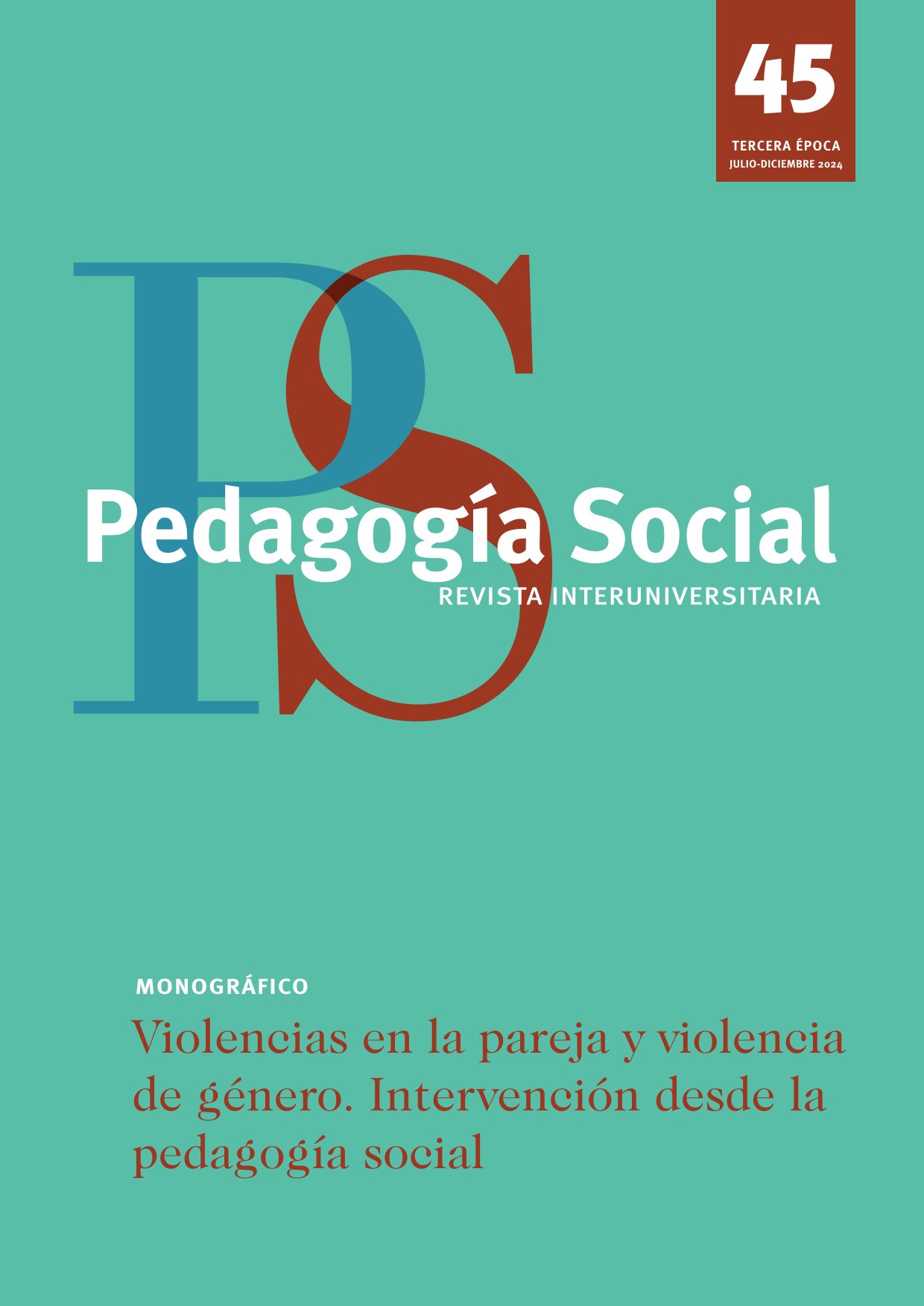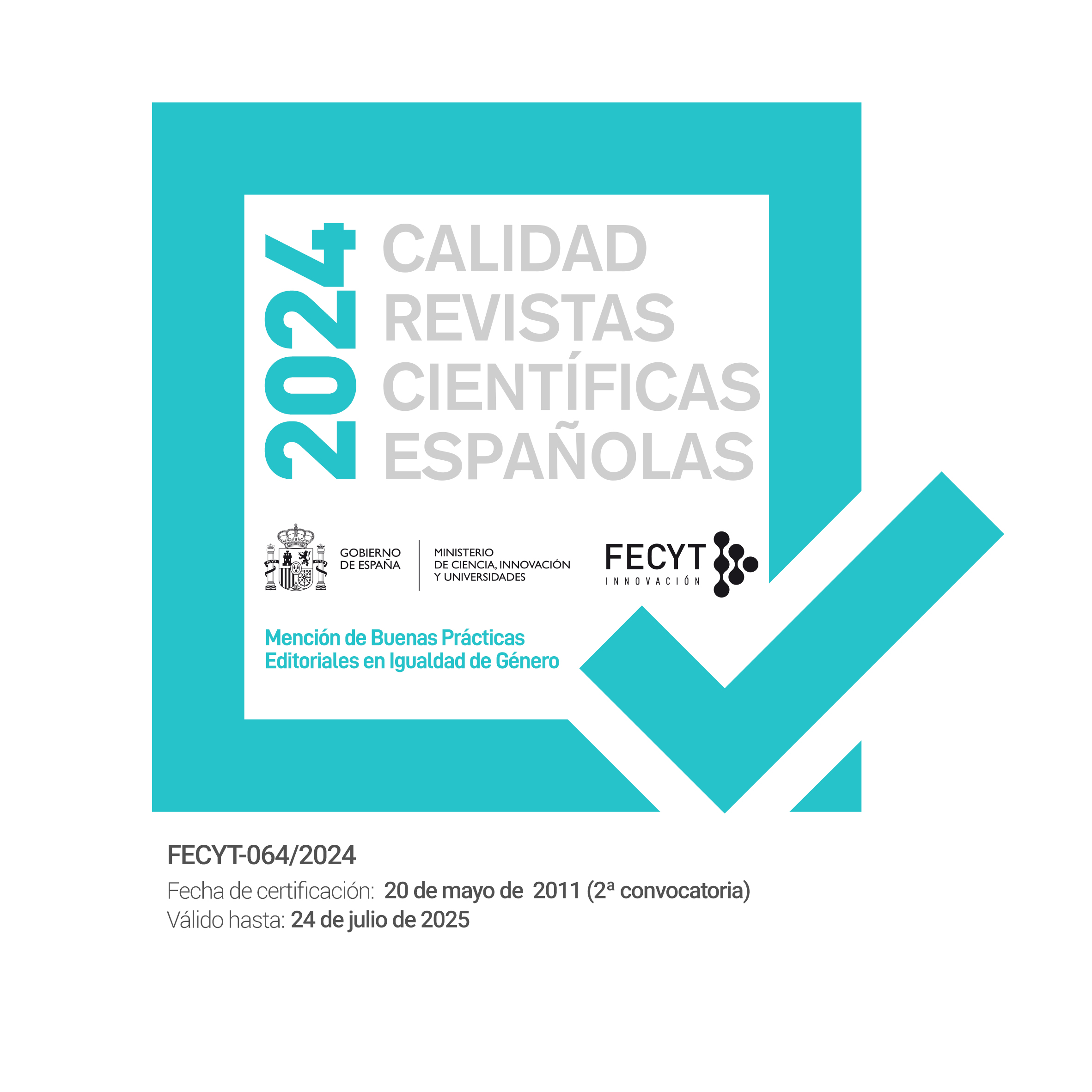Continuing education on children in vulnerable situations: needs and preferences for professionals
DOI:
https://doi.org/10.7179/PSRI_2024.45.14Keywords:
Vocational training, child protection, continuing education, human rights, children’s rightsAbstract
Continuous training for professionals is a challenge due to the need to keep people up to date in a constantly changing environment. This challenge is even greater when dealing with children in vulnerable situations because it affects their rights and it is essential to comply with international treaties also ratified by Spain, as well as with specific state and local community regulations. The text we present is part of a wider research, related to the study of needs and preferences of the group of professionals, belonging to different entities of the third sector of social action (foundations, associations, cooperatives, etc.), which develop the CaixaProinfancia Program in the Region of Murcia. The method used, with a quantitative approach, was the consultation of professionals who developed the PCPI, a non-experimental, descriptive or exploratory, survey-type research, with a theoretical framework based on a human rights approach. A total of 224 professionals participated in the survey, who were part of the PCPI in the RM, during the 2019-2020 academic year. The results showed the lack of training of this professional group in the knowledge of risk situations for children, related legislation, and autonomic protocol. It is concluded that there is an urgent need to articulate continuous training plans that integrate specific theoretical and practical contents on these issues, so that all the people professionally linked to the aforementioned program have the capacity to know how to detect situations of risk for children, as well as the regional protocol to be followed, if applicable.
Downloads
References
Asamblea General de la ONU (1948). Declaración universal de los derechos humanos. https://www.un.org/es/universal-declaration-human-rights/
Asamblea General de la ONU. (2015). Transformar nuestro mundo: La Agenda 2030 para el desarrollo sostenible. https://unctad.org/meetings/es/SessionalDocuments/ares70d1_es.pdf
Austin, A., Lesak, A. y Shanahan, M. E. (2020). Risk and protective factors for child maltreatment: A review. Current Epidemiology Reports, 7(4), 334-342. https://doi.org/10.1007/s40471-020-00252-3
Bas Peña, E. y Pérez de Guzmán Puya, V. (2017). Educación, salud y pobreza. Programa CaixaProinfancia en Murcia. Estudio de casos. Healt and Addictions/Salud y Drogas, 17(2), 179-188. https://dialnet.unirioja.es/servlet/articulo?-codigo=6106506
Bas Peña, E., Pérez de Guzmán, V. y Celorrio Moreno, S. (2021). Políticas educativas y formación en género en el grado de maestro y maestra de educación infantil, de las universidades españolas. Archivos Analíticos de Políticas Educativas, 29(92), 1-37. https://doi.org/10.14507/epaa.29.5181
Bégin, V., Déry, M. y La Croft, Y. (2020). Developmental Associations between Psychopathic Traits and Childhood-Onset Conduct Problems. Journal of Psychopathology and Behavioral Assessment, 42, 1-12.
Bronfenbrenner, U. (1979). The ecology of human developement: Experiments by nature and desing. Harvard University Press.
Civís Zaragoza, M. y Longás Mayayo, J. (2015). La colaboración interinstitucional como respuesta al desafío de la inclusión socioeducativa. Análisis de 4 experiencias de trabajo en red a nivel local en Cataluña. Educación XX1, 18(1), 213-236. https://doi.org/10.5944/educxx1.18.1.12318
Constitución Española. (1978). BOE núm. 311, de 29/12/1978. https://www.boe.es/buscar/act.php?id=BOE-A-1978–31229
Convención sobre la Eliminación de toda forma de Discriminación contra la Mujer. (2019). Informe Sombra sobre la aplicación en España 2015-2018 de la CEDAW. https://cedawsombraesp.files.wordpress.com/2019/05/190513-informe-cedaw-sombra.pdf
European Anti Poverty Network – España. (2012). Impactos de la crisis. 2º Informe. Seguimiento del indicador de riesgo de pobreza y exclusión social en España. https://www.eapn.es/estadodepobreza/ARCHIVO/documentos/Informe_AROPE_2012.pdf
European Anti Poverty Network – España. (2016). VI informe de la Red Europea de Lucha contra la Pobreza y la Exclusión Social en el Estado Español (EAPN-ES). El estado de la pobreza: Seguimiento del indicador de riesgo de pobreza y exclusión social en España 2009-2015. https://www.eapn.es/estadodepobreza/ARCHIVO/documentos/Informe_AROPE_2016_Resumen_Ejecutivo.pdf
European Anti Poverty Network – España. (2022). 12.º Informe anual sobre el estado de la pobreza. Seguimiento de los indicadores de la Agenda UE 2020. https://www.eapn.es/estadodepobreza/ARCHIVO/documentos/informe-AROPE-2022-resumen-ejecutivo.pdf
Fundación FOESSA y Cáritas Española. (2022). Evolución de la cohesión social y consecuencias de la COVID-19 en España. https://www.caritas.es/main-files/uploads/sites/31/2022/01/Informe-FOESSA-2022.pdf
García Gutiérrez, A. G., Mérida Serrano, R. M., Olivares García, M. A. y González Alfaya, E. (2023). Infancia víctima de violencia de género. Propuestas educativas frente a la violencia vicaria. Infancia y adolescencia, 12, 91-119. https://monografias.editorial.upv.es/index.php/iya/article/view/435
Gil-Flores, J., Padilla-Carmona, M. T. y Suárez-Ortega, M. (2011). Influence of gender, educational attainment, and family environment on the educational aspirations of secondary school students. Educational Review, 63(3), 345–363. https://doi.org/10.1080/00131911.2011.571763
Golinkoff, R. M., Hoff, E., Rowe, M. L., Tamis-LeMonda, C. S. y Hirsh-Pasek, K. (2019). Language matters: Denying the existence of the 30-million-word gap has serious consequences. Child Development, 90(3), 985-992. https://doi.org/10.1111/cdev.13128
Justice, L. M., Jiang, H., Purtell, K. M., Schmeer, K., Boone, K., Bates, R. y Salsberry, P. (2019). Conditions of poverty, parent-child interactions, and toddlers’ early language skills in low-income families. Maternal and Child Health Journal, 23(7), 971-978. https://doi.org/10.1007/s10995-018-02726-9
Ley Orgánica 4/1994, de 24 de marzo, de reforma del Estatuto de Autonomía de la Región de Murcia. BOE núm. 72, de 25 de marzo de 1994. https://www.boe.es/buscar/doc.php?id=BOE-A-1994-6943
Ley Orgánica 1/2004, de 28 de diciembre, de medidas de protección integral contra la violencia de género. BOE núm. 313, de 29/12/2004. https://www.boe.es/buscar/act.php?id=BOE-A-2004-21760
Ley Orgánica 26/2015, de 28 de julio, de modificación del sistema de protección a la infancia y a la adolescencia. BOE núm. 180, de 29/07/2015. https://www.boe.es/buscar/doc.php?id=BOE-A-2015-8470
Ley Orgánica 8/2021, de 4 de junio, de protección integral a la infancia y la adolescencia frente a la violencia. BOE núm. 134, de 05/06/2021. https://www.boe.es/boe/dias/2021/06/05/pdfs/BOE-A-2021-9347.pdf
Ley 3/1995, de 21 de marzo, de la infancia de la Región de Murcia. BOE núm. 131, de 2 de junio de 1995. https://www.boe.es/buscar/doc.php?id=BOE-A-1995-13297
Longás, J., Riera, J., y Civís, M. (2016). Asesoramiento al programa CaixaProinfancia; evaluación del cambio hacia un modelo de acción socioeducativa. Pedagogía Social. Revista Interuniversitaria, 28, 85-98. https://doi.org/10.7179/PSRI_2016.28.07
Longás, J., De Querol, R., Ciraso-Calí, A., Riera, J. y Úcar, X. (2018). Redes de acción socioeducativa contra la pobreza infantil. Evaluación de la percepción de impacto del programa CaixaProinfancia. Revista de estudios y experiencias en educación, 2, 109-126. https://doi.org/10.21703/rexe.Especial220181111286
Longás Mayayo, J., Cañete-Massé, C., Cussó-Parcerisas, I., Querol Duran, R. D. y Guàrdia-Olmos, J. (2021). Evaluación del programa CaixaProinfancia de refuerzo educativo y acompañamiento escolar. Pedagogía Social. Revista Interuniversitaria, 38c, 165-180. https://doi.org/10.7179/PSRI_2021.38.11
Masten, A. S. y Coastworth, J. D. (1998). The developement of competence in favorable and unfavorable environments: Lessons from research on successful children. Amerincan Psychologist, 53(2), 205-220.
Naciones Unidas (1989). Instrumento de Ratificación de la Convención sobre los Derechos del Niño, adoptada por la Asamblea General de las Naciones Unidas el 20 de noviembre de 1989. BOE núm. 313, de 31/12/1990. https://www.boe.es/eli/es/ai/1989/11/20/(1)
Naciones Unidas. (2020). Informe de políticas: Las repercusiones de la COVID-19 en las mujeres y las niñas. https://www.un.org/sites/un2.un.org/files/informe_guterres_covid_mujeres.pdf
Observatorio de Sostenibilidad (2016). Sostenibilidad en España 2016. Cumplimiento de los Objetivos de Desarrollo Sostenible de Naciones Unidas. http://www.observatoriosostenibilidad.com/documentos/SOS16_v23_PDF_final.pdf
Organización Mundial de la Salud (OMS) (2022). Maltrato infantil. https://www.who.int/es/news-room/fact-sheets/detail/child-maltreatment
Ortega, D. y Pagès, J. (2018). Género y formación del profesorado: análisis de las guías docentes del área de didáctica de las Ciencias Sociales. Contextos Educativos, 1(21), 53-66. https://doi.org/10.18172/con.3315. https://publicaciones.unirioja.es/ojs/index.php/contextos/article/view/3315
Quiroga, D. (coord.). (2023). Análisis de la encuesta de condiciones de vida con enfoque de infancia 2023. Plataforma de Infancia. https://www.plataformadeinfancia.org/wp-content/uploads/2023/07/INFORME-PLATAFORMA-INFANCIA-ECV-2023_ed03-1.pdf
Región de Murcia. (2008). Maltrato infantil. Protocolos de actuación. Murcia: Consejería de Política Social, Mujer e Inmigración Dirección General de Familia y Menor. https://murciasocial.carm.es/documents/20182/25532/Maltrato+infantil.+Protocolos+de+actuacion/88faa93d-6614-4476-895b-27d836d6100d
Resa Ocio, A. (2021). La formación en igualdad de género en los grados de educación primaria. Revista Electrónica Interuniversitaria de Formación del Profesorado, 24(1), 13-27. https://doi.org/10.6018/reifop.390951
Sabariego Puig, M. (2004). El proceso de investigación. En R. Bisquerra Alzina (Coord.), Metodología de la investigación educativa (5.ª ed., pp. 19-49).
Sánchez Morales, E. (2020). Papel de la educación en la primera infancia en una sociedad de cambio. INFAD – Revista de Psicología, 1(2), 255-262.
Save the Children (2022). Muchas personas juntas pueden cambiar el mundo. Memoria 2022. https://www.savethechildren.es/sites/default/files/202307/Memoria2022_QR_web.pdf
Smith, A. (2019). The Challenge of Continuous Training for Child Protection Professionals. Child Welfare Quarterly, 43(4), 321-334.
Tomás, J. M., Fernández, I., Navarro-Pérez, J.J. y Carbonell, Á. (2023). Evolución del riesgo y protección en la infancia y la adolescencia. Revista Latinoamericana de Ciencias Sociales, Niñez y Juventud, 21(3), 1-25. https://doi.org/10.11600/rlcsnj.21.3.5698
Torrado Fonseca, M. (2009). Estudios de encuesta. En R. Bisquerra Alzina (Coord.), Metodología de la investigación educativa (5.ª ed., pp. 231-257). La Muralla.
UNICEF (2020). Impacto de la crisis por Covid-19 sobre los niños y niñas más vulnerables.https://tiab-badalona.cat/wp-content/uploads/2020/09/covid19-infancia_vulnerable_unicef.pdf
Zeanah, C. H. y Smyke, A. T. (2009). Building attachment relationships following maltreatment and severe deprivation. En J. Cassidy y P. R. Shaver (Eds.). Handbook of attachement: Theory, research, and clinical aplications (pp. 611-634).
Published
How to Cite
Issue
Section
License

This work is licensed under a Creative Commons Attribution-NonCommercial-ShareAlike 4.0 International License.
Copyright and right to archive
The published version of the articles can be self-archived by their authors in open access institutional and thematic repositories. However, Pedagogía Social. Revista Interuniversitaria must authorize partial or global reutilisation on new papers or publications.
Published papers must be cited including the title of the journal Pedagogía Social. Revista Interuniversitaria, issue, pages and year of publication
Ethical responsibilities
Pedagogía Social. Revista Interuniversitaria does not accept any material that has been previously published in other documents or publications. Authors are responsible for obtaining the required permissions for partial or global reproduction any material from other publications, and to correctly quote its origin.
Pedagogía Social. Revista Interuniversitaria is obliged to detect and report fraudulent practices.
Only those who have intellectually contribute to the development of the paper must appear as authors.
The journal expects authors to declare any commercial partnership that might entail a conflict of interest with respect to the submitted article.
Authors must mention in the article, preferably in the “methodology” section, that the procedures used during the samplings and controls have been made after getting informed consent.
The journal will not use any received contribution in a way other than the goals described in these guidelines.
Copyright Notice
© Pedagogía Social. Revista Interuniversitaria. Papers published in both the printed and online versions of this Journal are property of Pedagogia Social. Revista Interuniversitaria, being required to cite the source in any partial or total reproduction.
Unless otherwise stated, all content of this electronic journal is distributed under "Creative Commons Attribution-Non commercial 3.0 Spain" (CC-by-nc) license for use and distribution. The informative version and the legal text of this license is available here. This has to be expressly stated in this way when necessary.






